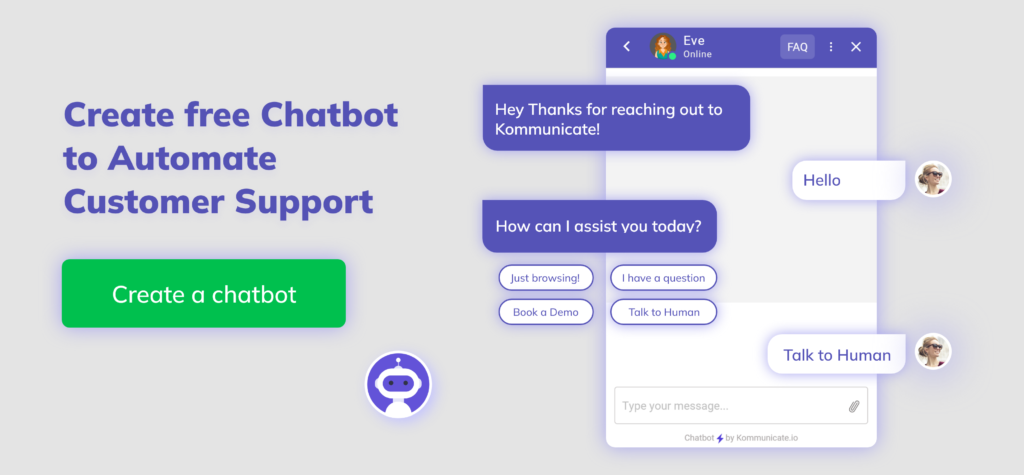Updated on May 26, 2025

In today’s competitive landscape, brand loyalty hinges on meaningful, personalized customer experiences. Consumers no longer settle for generic interactions; they expect smart, responsive, and human-like engagement from the first touchpoint. This shift has compelled businesses to rethink how they communicate with customers, especially when it comes to support.
Enter Conversational AI. Powered by large language models like OpenAI’s ChatGPT, conversational AI enables businesses to deliver personalized, real-time support at scale – without the overhead of large customer service teams.
Customer support, in particular, has become a key differentiator. It’s often the first and most critical impression a brand makes. Get it wrong, and you risk losing a potential customer forever. Get it right, and you build a lasting relationship.
With AI agents now handling everything from basic queries to complex issue resolution, understanding how conversational AI is transforming customer support isn’t optional – it’s essential. This blog post explores that transformation and how modern businesses can harness AI to create efficient, scalable, and loyalty-driving support systems.

Conversational AI vs. Other Support Solutions
The most significant advantage of chatbots is answering many questions instantaneously and doing that without needing a customer support team of 500 people. Given how many first interactions revolve around straightforward or simple questions, an automated solution does the job well.
But customers want a personalized experience. They’re looking for a company that will go the extra mile for them, and a simple chatbot doesn’t provide that. Conversational AI is different.
A 2017 survey showed that 87% of retailers believed that using AI in their support strategy would lead to better customer experiences. 47% of those same retailers predicted that it would also increase customer lifetime value, which means happy returning customers.
As a bonus, conversational AI is also future-proofed (at least to a certain extent). AI and supporting technologies will only improve over time. And these developments will be implemented by companies that specialize in this sort of software.
No matter how large your platform grows — and no matter how diverse your products or services become — an automated support system will always keep up with your customer base’s needs. That can allow businesses to invest in areas of necessity rather than still trying to keep up with the customer support snowball.
Who knows, you might end up with a conversational AI that can deal with the majority of questions (and concerns), leaving your customer service team to focus on building relationships and providing that human touch that people expect from positive support interactions.
More Than Just A Trend
Conversational AI isn’t the same as a digital assistant or a preprogrammed chatbot. It’s a much broader solution to support needs, because it is just as capable of learning customer needs and how to solve them (thanks to machine learning developed over time).
That’s not to say you can’t put it to fair use right away. In some cases, automated chat support is a way to address common questions as soon as someone visits your site. In other cases, it’s a way to reduce the workload for your human support team, or perhaps — if you’re a small business without a dedicated customer service team — play the role of that department entirely.
But the point is that this service can meet a lot of needs. And that adaptability is why conversational AI has become a standard feature for so many industries.
A major component of that adaptability is that conversational AI learns how best to interact with each unique customer. That means you will be able to provide a more personalized approach with these conversations. Much like how a sales clerk can greet familiar faces in a physical setting.
48% of customers spend more when their shopping experience is customized. That’s not a 1:1 correlation (a conversational AI can’t guarantee you a 48% boost in sales). But it sets a good benchmark for what this process can add. It also explains why automated systems are so much more than the newest trendy solution for startup tech companies.
And the chances are that your competitors already use conversational AI.
If you see their websites or social profiles, you’ve probably seen a chatbot on the corner of your screen. This sort of competitor research can be an easy way to figure out how widespread this software is, and whether or not your customers expect to get this kind of instantaneous support from your company too.
Conversational AI for customer support – in a nutshell
You can think of conversational AI as bringing a few key value propositions at the end of the day. And the most important one is that they bring 24-hour support (even on holidays!). That means you don’t need customer support working around the clock or taking questions off the clock.
Chatbots lighten the support team’s load. They allow people to have healthy workloads while trusting automated systems to handle after-hours requests. But a system that uses machine learning continues to expand its understanding of customer issues. It learns how your products or services work over time and data. Further, conversational AI becomes capable of answering questions in a way that won’t force your team to come in behind them constantly.
But leveraging machine learning also becomes a chance to collect data. People can fulfill this task by recording a support call or making account notes after each online chat. But conversational AI can instantly log every question and response it receives. It can then use that data to improve future interactions with that user and when others ask similar questions.

That’s a skill that the best customer support teams strive to achieve. Chatbots do it automatically and consistently, providing a sense of consistency over time.
And that kind of messaging is something that helps build trust with a customer.
As much as 70% of customers prioritize connected experiences (like personalized engagement) before making a purchasing decision. In the same Salesforce study, 63% of surveyed people expect companies to recognize them across different platforms. Additionally, 49% of them had zero patience for disconnected engagements.
Wrapping Up
Conversational AI is a tool that you can use to help your support team, benefit your customers, and ultimately help your business settle into a healthier — and more sustainable — habit of how, when, and where you engage with people.
This is more evident in customer support specifically. Humans are already overwhelmed by the amount of easy and redundant customer questions coming their way time and again. And with smarter algorithms popping up every day, the future is bright for customer support powered by conversational AI.
This is a guest post by Drew Gula.
Drew Gula is the copywriter at Soundstripe. It produces resources, like royalty free music and storyboard templates, to help businesses improve their video marketing.
At Kommunicate, we are envisioning a world-beating customer support solution to empower the new era of customer support. We would love to have you on board to have a first-hand experience of Kommunicate. You can signup here and start delighting your customers right away.



![What is Conversational Intelligence [Benefits + Features] cover image of conversational intelligence.](https://www.kommunicate.io/blog/wp-content/uploads/2025/04/Featured-Images-1-1-1.avif)

